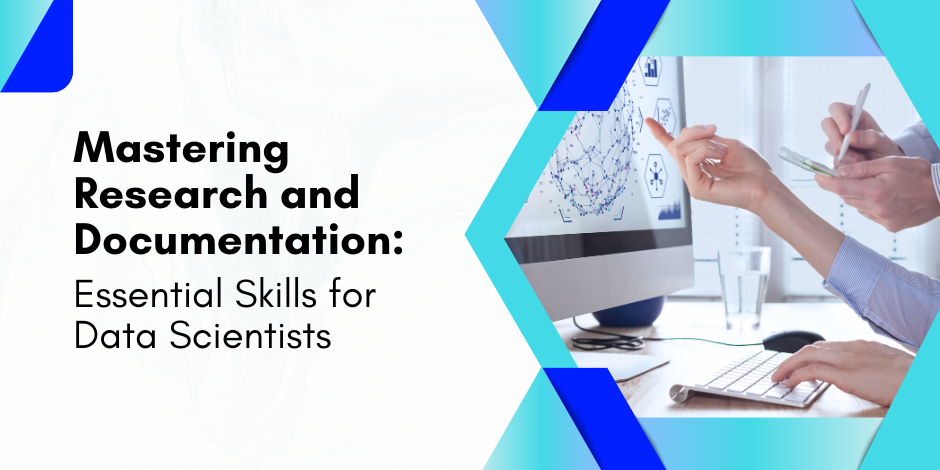Mastering Research and Documentation: Essential Skills for Data Scientists

Stay Informed With Our Weekly Newsletter
Receive crucial updates on the ever-evolving landscape of technology and innovation.
The field of data science is complex and multifaceted, requiring a diverse set of skills, such as research and documentation.
With the global data science platform market projected to grow from $81.47 billion in 2022 to $484.17 billion by 2029, the importance of robust research methodologies in this field becomes even more pronounced.
Among these, research and documentation often take a backseat to more technical abilities, although mastering each is essential for any data scientist aiming to excel in their field.
This article delves into the importance of research and documentation, how to develop them, and their application in data science.
Understanding the importance of research and documentation

Research is the backbone of any scientific endeavor, and data science is no exception.
It systematically investigates sources and materials to establish facts and reach new conclusions.
In data science, research skills are essential for understanding the problem, identifying suitable data sources, and interpreting the results accurately.
Documentation, on the other hand, is the detailed recording of a research project’s processes, methodologies, and results.
Effective documentation ensures that others can understand, replicate, and build upon the work.
In the context of data science, it aids in maintaining data integrity, improving collaboration, and enhancing the overall efficiency of the project.
Together, research and documentation skills can greatly enhance your skills as a data scientist.
Mastering research skills
The first step towards mastering research is developing a research-oriented mindset. This involves cultivating curiosity, critical thinking, and a keen eye for detail.
A good data scientist always asks questions, seeks answers, and strives to understand the bigger picture.
It also involves being open to new ideas and perspectives. Data science is a rapidly evolving field, and staying up-to-date with the latest developments is crucial.
This requires regular reading of scientific literature, attending seminars and workshops, and engaging in discussions with peers and experts in the field.
Acquiring research techniques
Beyond the mindset, mastering research also involves acquiring specific techniques. These include data collection, data analysis, and result interpretation.
Data collection involves identifying relevant data sources, designing data collection instruments, and gathering the data systematically and ethically.
Data analysis, however, involves cleaning and preprocessing the data, selecting appropriate statistical methods, and applying these methods to conclude.
Interpretation of results requires a deep understanding of the problem, the data, and the statistical methods used.
It also involves communicating these results effectively to a non-technical audience.
Mastering documentation skills

Good documentation is a critical component of any data science project.
It provides a clear and detailed record of the project, including the research question, the data sources, the methodology, the results, and the conclusions.
This allows others to understand, replicate, and build upon the work.
Moreover, good documentation also aids in project management. It helps track the project’s progress, identify bottlenecks, and ensure that it stays on track.
It also serves as a valuable resource for training new team members and reviewing the project later.
Developing documentation techniques
Mastering documentation involves developing a set of specific techniques, including note-taking, report writing, and version control.
Note-taking involves recording the details of the project as it progresses. This includes the research question, the data sources, the methodology, the results, and any issues or challenges encountered.
Report writing involves compiling these notes into a comprehensive and coherent document.
This requires good writing skills, the ability to organize information logically, and the ability to present complex data clearly and understandably.
Version control, on the other hand, involves tracking the different versions of the project, including the changes made and the reasons for these changes.
Applying research and documentation skills in data science

Mastering research and documentation is not an end in itself but a means to an end. The ultimate goal is to apply research and documentation in data science efficiently.
A good research and documentation strategy involves using research skills to understand the problem, identify suitable data sources, and interpret the results accurately.
It also involves using documentation skills to record the processes, methodologies, and results of the project clearly and in detail.
Conclusion
Mastering research and documentation is essential for any data scientist aiming to excel in their field. It not only enhances the quality of their work but also improves their efficiency, collaboration, and overall impact.
So, if you are a data scientist or aspiring to be one, invest time and effort in mastering these crucial skills.
Want to learn more about research and documentation?
Download a copy of the Institute of Data’s Data Science & AI program outline for free to see what it entails.
Alternatively, we invite you to schedule a complimentary career consultation with a member of our team to discuss the program in more detail.





